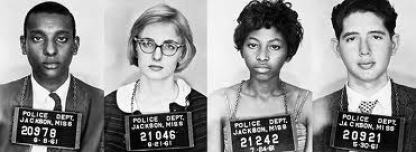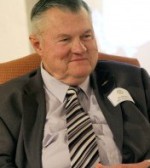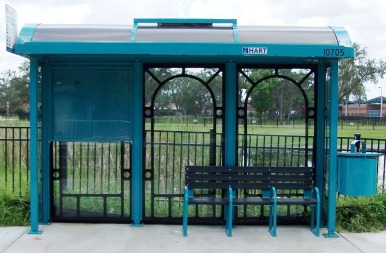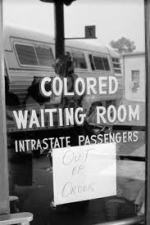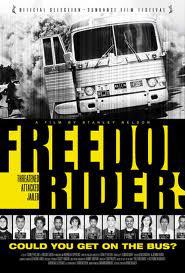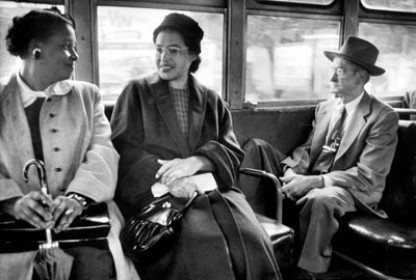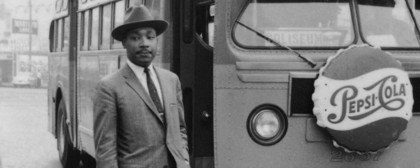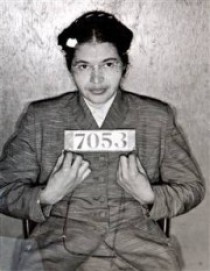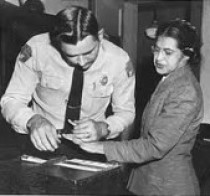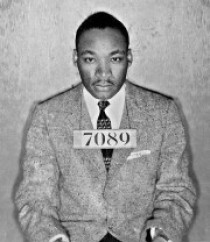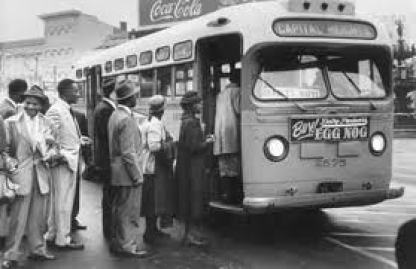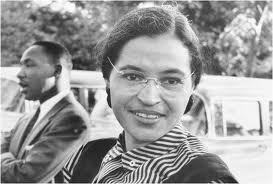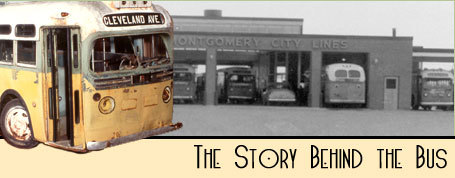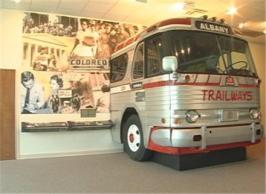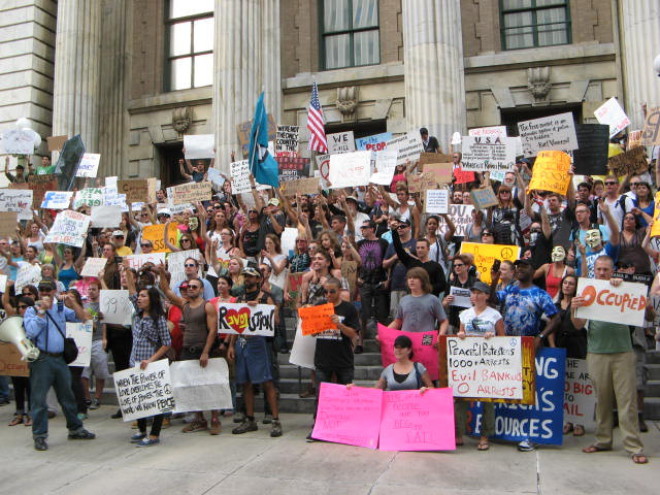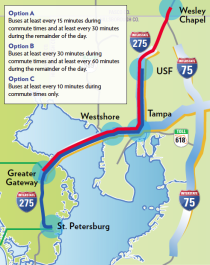U.S. Judge Wm Terrell Hodges: Bus stop shelter destroyed - violated civil rights of Tampa bus riders
The bus is an important part of the American Civil Rights movement, for both city & interstate bus riders
HART TITLE VI CIVIL RIGHTS PROGRAM
HART operates its programs and services without regard to race, color, and national origin in accordance with Title VI of the Civil Rights Act. Read more
U.S. Judge Wm Terrell Hodges: Bus stop shelter destroyed - violated civil rights of Tampa bus riders
Link to Judge Hodges' papers
A story published November 13th, 2012 by Richard Goldstein on FlaLawOnline would cause a reasonable person to conclude federal judges of the Eleventh Circuit and Middle District Florida routinely violate the civil rights of ordinary people, and fail to uphold their oath of office, fail to administer justice without respect to persons, and fail to do equal right to the poor and to the rich, and fail to faithfully and impartially discharge and perform all the duties incumbent upon them as a federal judge, and routinely disregard the Constitution and laws of the United States.
See, Judge Hodges honored at reception, by Richard Goldstein
http://www.law.ufl.edu/flalaw/2012/11/judge-hodges-honored-at-reception/
Still, one story of the way Hodges exercised power elicited knowing laughter from the audience that included UF Law students.
Judge Gerald Bard Tjoflat of the 11th U.S. Circuit Court of Appeals explained that Tampa maintained a bus stop immediately in front of the courthouse steps while Hodges was chief judge of the middle district during the 1980s.
"The city of Tampa had a bus system and they had a monstrous bus stop at the base of the old federal courthouse in Tampa. All the buses came there and the jurors would have trouble getting up there" to the courthouse, Tjoflat said.
Hodges sent a letter to the mayor demanding that the bus stop be moved. When no action ensued, Tjoflat said, federal marshals dismantled the offending public transportation facility with blow torches.
Sitting on a dais with Tjoflat, Hodges accepted laconically the stories and praise offered during the "Toast to Judge Hodges" event.
"That was the result of deputies who volunteered; no order was given so it was unappealable," Hodges deadpanned.
I rode that bus when I lived in Tampa. People like me who ride the bus are held in contempt by Judge Hodges, Judge Tjoflat, and the UF Law students. Public records provided by the bus company include the correspondence of Judge Hodges. Contemporaneous news accounts also confirm the story is factual. Therefore, there is evidence that Judge Hodges engaged in bad behavior, and under Article III should be removed from office. See 28 U.S. Code Chapter 16 Complaints Against Judges and Judicial Discipline.
U.S. Judge Wm Terrell Hodges: Bus stop shelter destroyed - violated civil rights of Tampa bus riders
Judge Hodges letter March 22, 1985 to GS[...]
Adobe Acrobat document [55.5 KB]
Judge Hodges letter May 1, 1985 to HART[...]
Adobe Acrobat document [17.6 KB]
Destroy - definition of destroy by The Free Dictionary
v.tr.
1. To break apart the structure of, render physically unusable, or cause to cease to exist as a distinguishable physical entity...
2. To put an end to; eliminate...Read more
Composite document 41 pages
Judge Hodges Destroyed Bus Stop Shelter,[...]
Adobe Acrobat document [1.5 MB]
U.S. Judge Wm Terrell Hodges: Bus stop shelter destroyed - violated civil rights of Tampa bus riders
Board Packet 05-10-1985, 35p, WTH ltrs..[...]
Adobe Acrobat document [1.3 MB]
Board Packet 06-03-1985, 5p, NACCP..pdf
Adobe Acrobat document [165.1 KB]
The old federal courthouse Tampa, Florida. Gone now.
U.S. Judge Wm Terrell Hodges: Bus stop shelter destroyed - violated civil rights of Tampa bus riders
U.S. Judge Wm Terrell Hodges: Bus stop shelter destroyed - violated civil rights of Tampa bus riders
Tampa Judge Axes Shelters At Bus Stop
Orlando Sentinel
By United Press International
May 7, 1985
TAMPA — Curbside bus stop shelters have been removed from the sidewalks in front of the downtown post office and federal court building by U.S. marshals on the order of U.S. District Judge William Terrell Hodges.
The shelters were removed Sunday, leaving about 3,000 daily bus riders with no protection from the sun and rain and almost nowhere to sit while waiting.
Hodges' order was not challenged by the city of Tampa or the Hillsborough Area Regional Transit Authority (HART), but did evoke calls from angry riders. HART Executive Director Cliff Hayden said the authority received calls from about 100 angry riders last week.
''They can't understand what gives the judge the authority to take them down,'' he said.
''I just don't have any comment to make about it,'' Hodges said Sunday.
Hayden said a new bus plaza is planned nearby but it will be a year before it will be operating. He said HART has no plans to provide seating for riders outside the courthouse.
''I guess they'll be standing on the sidewalk and some (sitting) on the courthouse steps,'' Hayden said.
Hodges issued the order several weeks ago because he said the people massed around the shelters waiting for buses caused intolerable congestion and hampered the coming and going of federal court jurors.
He gave the city and HART an ultimatum -- remove the shelters or he would have U.S. marshals do the job.
Neither the city nor HART acted. On Sunday, a team of seven marshals aided by a welder, spent five hours dismantling and removing the shelters. Read more
Tampa Judge Axes Shelters At Bus Stop.pd[...]
Adobe Acrobat document [27.6 KB]
HART Capital projects - Bus Shelter Infrastructure improvements
HART Capital projects - Bus Shelter Infrastructure improvements
HART is committed to providing quality service through realignments and upgrades of bus stops and bus shelters throughout the county. For the most part, these improvements are carried out on a route by route basis. For these projects, HART works in collaboration with local jurisdictions, developers and private property owners to engage in cost sharing opportunities or establish right-of-way easements for placement of transit infrastructure. Where other agencies implement roadway improvements or sidewalk installations, HART works with these entities to incorporate shelter/landing pads and bus bays where appropriate.
U.S. Judge Wm Terrell Hodges: Bus stop shelter destroyed - violated civil rights of Tampa bus riders
Bench Battle, Part 2
orlandosentinel.com
By Harry Straight and Donna Blanton
of the Sentinel Staff
June 9, 1985
IF YOU EVER DOUBTED the power of the federal bench, take a look at a compromise between U.S. District Judge W. Terrell Hodges and the Tampa bus system. Hodges last month ordered U.S. marshals to remove sidewalk bus shelters in front of Tampa's federal courthouse. The shelter crowds were hazardous to people going in and out of the courthouse, Hodges said. None of Tampa's politicians offered a solution to the Hillsborough Area Rapid Transit Authority, which owns the shelters. Its lawyers worked out a compromise with Hodges for a smaller shelter around the corner from the old one. Crowds were never a problem until the courthouse was renovated last year and new security precautions forced everyone going to the courthouse to use the front door only. Guess what federal judge was in charge of the renovation?
Bench Battle, Part 2 - tribunedigital-or[...]
Adobe Acrobat document [50.2 KB]
HART TITLE VI CIVIL RIGHTS PROGRAM
HART TITLE VI CIVIL RIGHTS PROGRAM
HART operates its programs and services without regard to race, color, and national origin in accordance with Title VI of the Civil Rights Act. Any person who believes she or he has been aggrieved by any unlawful discriminatory practice under Title VI may file a complaint with HART.
- Title VI Complaint Form
- HART Proposed Title VI Policies
- Printable Notice of Public Rights Under Title VI
- Click here to file a Title VI complaint directly with the Federal Transit Administration
A Community with HART - Newsletter January/February 2013
By its Charter and its designation as a regional transportation organization established pursuant to Florida Statutes, HART is responsible for meeting the mass transit needs of its member jurisdictions. Currently, member jurisdictions contiguous to those of its current members are also eligible to become members of HART.
Chapter 163, Fla. Stat., Part V Regional Transportation Authorities
Charter for the Hillsborough Area Region[...]
Adobe Acrobat document [107.0 KB]
U.S. Judge Wm Terrell Hodges: Bus stop shelter destroyed - violated civil rights of Tampa bus riders
Judge Orders Bus Shelters Be Removed
sun-sentinel.com
United Press International
May 7, 1985
TAMPA — Curbside bus stop shelters have been removed from the sidewalks in front of the downtown post office and federal court building by U.S. marshals on the order of U.S. District Judge William Terrell Hodges.
The shelters were removed Sunday, leaving about 3,000 daily bus riders with no protection from the sun and rain and nowhere to sit while waiting except on a short wall between the lawn and the sidewalk and the wide front steps.
The order by Hodges was not challenged by the City of Tampa or the Hillsborough Area Regional Transit Authority but did evoke some calls from angry riders.
HART Executive Director Cliff Hayden said the authority received calls from about 100 angry riders last week.
"They can`t understand what gives the judge the authority to take them down," he said.
"I just don`t have any comment to make about it," Hodges said Sunday.
Hayden said a new bus plaza is planned nearby but said it is a year away from being operational.
Hodges issued the order several weeks ago because he said the people massed around the shelters waiting for buses caused intolerable congestion and hampered the coming and going of federal court jurors.
Judge Orders Bus Shelters Be Removed - s[...]
Adobe Acrobat document [50.5 KB]
The bus is an important part of the American Civil Rights movement, for both city & interstate bus riders
Wikipedia
Jim Crow laws were state and local laws enforcing racial segregation in the Southern United States. Enacted after the Reconstruction period, these laws continued in force until 1965. They mandated de jure racial segregation in all public facilities in states of the former Confederate States of America, starting in 1890 with a "separate but equal" status for African Americans. Conditions for African Americans were consistently inferior and underfunded compared to those available to white Americans. This body of law institutionalized a number of economic, educational and social disadvantages. De jure segregation mainly applied to the Southern United States, while Northern segregation was generally de facto — patterns of housing segregation enforced by private covenants, bank lending practices and job discrimination, including discriminatory union practices. Read more
FREEDOM RIDERS is the powerful harrowing and ultimately inspirational story of six months in 1961 that changed America forever. From May until November 1961, more than 400 black and white Americans risked their lives—and many endured savage beatings and imprisonment—for simply traveling together on buses and trains as they journeyed through the Deep South. Deliberately violating Jim Crow laws, the Freedom Riders met with bitter racism and mob violence along the way, sorely testing their belief in nonviolent activism.
Thanks to Chuck Henson for shining a light on our Travel Training program. Mark Sheppard, our original Travel Trainer, is such a treasure to HART. We think his passion for helping others really comes through in this clip.
Posted by Hillsborough Area Regional Transit on Thursday, June 18, 2015
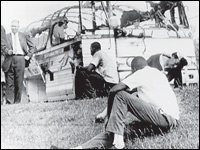 Freedom Riders Jimmy McDonald, left, and Hank Thomas and regular passenger Roberta Holmes sit in front of the burned-out shell of a "Freedom Bus" on May 14, 1961.
Freedom Riders Jimmy McDonald, left, and Hank Thomas and regular passenger Roberta Holmes sit in front of the burned-out shell of a "Freedom Bus" on May 14, 1961.
Get On the Bus: The Freedom Riders of 1961
National Public Radio
January 12, 2006
In 1961, the Freedom Riders set out for the Deep South to defy Jim Crow laws and call for change. They were met by hatred and violence — and local police often refused to intervene. But the Riders' efforts transformed the civil rights movement.
Raymond Arsenault is the author of Freedom Riders: 1961 and the Struggle for Racial Justice. The book details how volunteers — both black and white — traveled to Mississippi and Alabama to fight segregation in transit systems.
Despite being backed by recent federal rulings that it was unconstitutional to segregate bus riders, the Freedom Riders met with obstinate resistance — as in Birmingham and Montgomery, where white supremacists attacked bus depots themselves.
In Freedom Riders, Arsenault details how the first Freedom Rides developed, from the personal level to the legal maneuvering involved. His narrative touches on elements from the jails of Alabama to the Kennedy White House.
Arsenault is the John Hope Franklin Professor of Southern History and co-director of the Florida Studies Program at the University of South Florida in St. Petersburg. His previous writing includes Land of Sunshine, State of Dreams: A Social History of Modern Florida and Crucible of Liberty: 200 Years of the Bill of Rights, which he edited.
Read an excerpt from Freedom Riders: Read more
Montgomery Bus Boycott: 1955 - 1956
The Montgomery Bus Boycott and Desegregation, by John Fuller. Rosa Parks, center, one of the most famous figures from the civil rights movement, helped spark the Montgomery Bus Boycott. Don Cravens/Time Life Pictures/Getty Images
ABA Journal: Institute Claims Rosa Parks’ Estate Drained by Fees for Lawyers Who Also Got Licensing Rights (July 21, 2011)
Montgomery Bus Boycott
Wikipedia
The Montgomery Bus Boycott was a political and social protest campaign that started in 1955 in Montgomery, Alabama, United States, intended to oppose the city's policy of
racial segregation on its public transit system. Many important figures in the civil rights movement were involved in the boycott, including Reverend Martin Luther King, Jr., Ralph Abernathy, and
others, as listed below.
The boycott caused crippling financial deficit for the Montgomery public transit system, because the city's black population who were the principal boycotters were also the bulk of the system's paying customers. The campaign lasted from December 1, 1955, when Rosa Parks, an African American woman, was arrested for refusing to surrender her seat to a white person, to December 20, 1956, when a federal ruling, Browder v. Gayle, took effect, and led to a United States Supreme Court decision that declared the Alabama and Montgomery laws requiring segregated buses to be unconstitutional. Read more
Alabama deputy discovers civil rights era artifacts
MSNBC/Associated Press
July 23, 2004
MONTGOMERY, Ala. - A sheriff’s deputy who was cleaning a basement storage room stumbled upon a box containing a trove of artifacts from the civil rights era, including
black-and-white mug shots of Rosa Parks and a young Martin Luther King Jr.
Historians called the discovery a significant find that provides a one-of-a-kind time capsule into the early days of the civil rights struggle. The 1956 mug shot of King
after being arrested in the historic Montgomery bus boycott could be a record of his very first arrest, said Horace Huntley, director of the Oral History Project at the Birmingham Civil Rights
Institute.
"I think that is a tremendous find," Huntley said. "It gives us a window to the past that we absolutely would not see otherwise." Read more
Rosa Parks - Story Behind the Bus
Next Stop with HART: New HARTPlus Minivans, for riders with disabilities; Americans With Disabilities Act
Sam M. Gibbons Federal Courthouse Tampa, Florida
Sam M. Gibbons Federal Courthouse, Middle District of Florida, Tampa. Link Cases. Link Facebook. Link Wikipedia.
Replaced the old federal courthouse where Judge Hodges had the bus stop destroyed. Link FourSquare Link parking map
Orlando Sentinel
Ruling Appealed
STATE
March 2, 1989
ORLANDO — A group of blacks who filed a racial discrimination suit against the city of Orlando is appealing a federal judge's recent rejection of four of their seven claims. ''Rambling and confusing'' is how U.S. District Judge William Terrell Hodges described the allegations made by the Committee of Organized Groups, or COG. Hodges agreed to hear a few of the claims of civil-rights violations, but he denied the group's request to stop the city from putting more money into at least 12 projects, including the Orlando Arena, the Florida Citrus Bowl and three low-income housing projects. The case was appealed to the 11th Circuit Court of Appeals in Atlanta. COG members allege a conspiracy by city officials to intentionally disregard the views of blacks in land-use decisions, housing and economic development. They also resent the city's endorsement of a state project that will extend the John Young Parkway.
Occupy Tampa - This is What Democracy Looks Like!
Video October 6, 2011 Tampa Florida during the Occupy protest. The video has footage of the old ferderal Tampa court house.
EXPRESS BUS IN TAMPA BAY EXPRESS LANES
The Express Bus in Tampa Bay Express Lanes Study evaluated potential premium express bus service operating within proposed tolled interstate express lanes. The study goals include providing regional, long-distance service that quickly moves commuters between key destinations, and increasing the overall capacity of the interstate. This study also looked at the feasibility of providing regional transit service to beaches, business districts, and multimodal centers in Hillsborough, Pinellas, and Pasco Counties.
Read the full study summary as well as FAQs on the Express Bus concept HERE. Read the Express Bus Tech Memo HERE.


